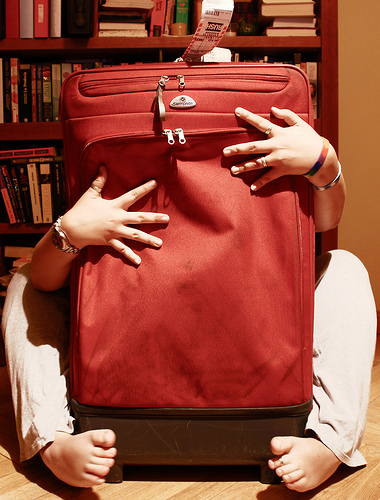Could you do it? Seriously, could you pack two suitcases weighing no more than 50 pounds each and one carry-on bag with enough clothes and worldly goods to see you through a year?
Minimalism as a lifestyle is gaining more and more followers. A growing variety of blogs and publications deals with the topic, ranging from how to reduce your possessions to no more than 100 items to how to live a minimal lifestyle with a family to how to pursue a car-free life. Clearly, it can be done and done well.
![2391393336_40b1c00562[1]](https://www.stewardshipoflife.org/wp-content/uploads/2010/09/2391393336_40b1c005621-300x199.jpg) I thought about these things as I watched my daughter pack for a year abroad teaching ESL. Yes, she would be provided with basic accommodations, but 100 pounds is not very much when it gets right down to it, especially considering six or so pounds was gifts of honey and apple butter for her co-teachers and administrators and a major portion of her wardrobe was attire suitable for teaching.
I thought about these things as I watched my daughter pack for a year abroad teaching ESL. Yes, she would be provided with basic accommodations, but 100 pounds is not very much when it gets right down to it, especially considering six or so pounds was gifts of honey and apple butter for her co-teachers and administrators and a major portion of her wardrobe was attire suitable for teaching.
My reduction of moving a household from North Dakota to Tennessee in two cars suddenly didn’t seem like such an amazing accomplishment. Granted, she left the equivalent of about 14 large plastic tubs of stuff behind (dishes, skates, movies, books, games, her Xbox360, and clothes) and one small dog, but still, could I–would I–do what she just did?
It would be probably be difficult, even though I would like to think that I could make a conscious decision to do so. After all, I have come a long way in a short time–from over 100 boxes of books alone to two small folding shelves of books, from two hanging wardrobes and boxes upon boxes of clothes to about 100 articles of clothing, and from enough stuff to fill a 2600 square foot parsonage to capacity to comfortably inhabiting a two bedroom apartment (and still feeling like it is too large).
In Paul’s first letter to Timothy (6.7-8), he says, “for we brought nothing into the world, so that we can take nothing out of it; but if we have food and clothing, we will be content with these.” Jesus also seems to have thought that an abundance of possessions was overrated, instructing his disciples in Matthew 10.9-10, “Take no gold, or silver, or copper in your belts, no bag for your journey, or two tunics, or sandals, or a staff; for laborers deserve their food.” Somehow, I don’t think these principles fly too well in contemporary western culture, unless one is committed to the principles of “freeganism” or intends to become a Buddhist monk with a begging bowl.
Still, there is an allure to minimalism. To not be possessed or controlled by one’s possessions or debt or the visible trappings of success can look like some pretty green grass on the other side of the cultural fence. Looking at the issue from a biblical perspective, when one is not ensnared the desire for more, one is able to look outward and see the needs of one’s neighbor. It becomes more possible to forge community and meaningful relationships. Wants AND needs are few when life is viewed from this perspective, but meaning is large. For example, consider the lifestyle choices of those individuals now known as the “new monastics.” Few possessions, solidarity with the marginalized and dispossessed, and a joyful, almost sacramental approach to living in the present and following the example of Christ are markers of this growing movement.
![1425324470_4ac53ec70f[1]](https://www.stewardshipoflife.org/wp-content/uploads/2010/09/1425324470_4ac53ec70f1-300x225.jpg) While I would certainly not class my daughter as a new monastic, I do see her as a part of a generation less enamored with the trappings of success, fed up with current patterns of overconsumption, and much more interested in defining life in terms of relationships and experiences. It is this approach to living that enabled her to reduce her possessions to 100 pounds and fly half way around the world to live and work, to trust that enough is indeed enough, and that there is much more to life than MasterCard.
While I would certainly not class my daughter as a new monastic, I do see her as a part of a generation less enamored with the trappings of success, fed up with current patterns of overconsumption, and much more interested in defining life in terms of relationships and experiences. It is this approach to living that enabled her to reduce her possessions to 100 pounds and fly half way around the world to live and work, to trust that enough is indeed enough, and that there is much more to life than MasterCard.
Perhaps I can learn a thing or two from her. Let’s see…what would be the first thing to go?
Photos by Lu, Rene Earhardt, and k_hargrav used under a Creative Commons license. Thanks!




Leave a Reply